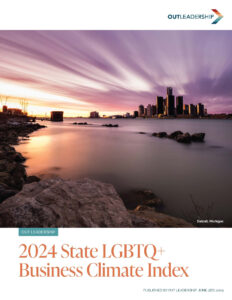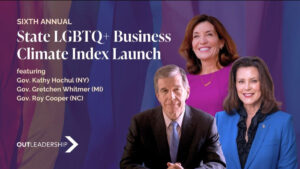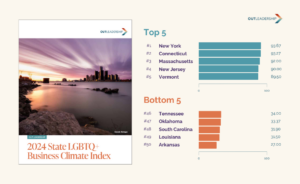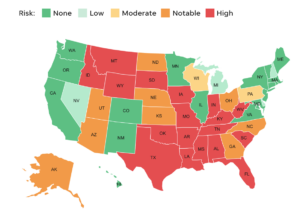
In my 4 years at Out Leadership, the State LGBTQ+ Business Climate Index has been the research project I am both most excited about and that I dread the most. I am excited because I know how much of an impact it has on our Out Leadership member companies, for community leaders, and even the impact on state-centered business conversations and statewide policies. However, I also feel dread when starting the project because it’s hard to see the regression in scores that quantify the reality for LGBTQ+ individuals and families in many states across the country.
Since the State LGBTQ+ Business Climate Index was first published 6 years ago, we have seen enormous progress for the LGBTQ+ community. Unfortunately, we have also seen increasingly public and frequent successful policy attacks on the rights of LGBTQ+ individuals at the state level.

Pictured above: Michigan Governor Gretchen Whitmer signs bipartisan legislation expanding the rights and freedoms for LGBTQ+ Michiganders in March 2023.
These have a profound negative impact on what it is like to live, work, build a family, run a business and overall build a life for the LGBTQ+ community. This is difficult for LGBTQ+ people and their families AND has a negative impact on businesses from a talent perspective. We know that 36% of LGBTQ+ individuals have considered moving to a new city/state because of an unfriendly environment for the LGBTQ+ community. Of those that considered moving, about ⅓ said they would take a pay cut to do so.

Pictured above: Out Leadership Founder & CEO Todd Sears speaks with North Carolina Governor Roy Cooper on the state of LGBTQ+ equality in the United States.
The pushback against DEI and the LGBTQ+ community is not only bad policy, it’s also bad for business. As I write this letter, I am on my way home from speaking at the BIO conference in San Diego. During the panel on DEI and the workforce, we spoke about how businesses valuing the needs and the diversity in the workforce is an imperative and is not going away. We may get new acronyms or ways to speak about diversity, but having a supported and diverse workforce is what drives innovation and impact. I hope our climate index can be an agent for companies and business leaders to double down on DEI and local political leaders to stop anti-LGBTQ+ policy.

Pictured above: Jane Barry-Moran discusses Out Leadership’s research at the Q2 Member Council Meeting, hosted by Paul, Weiss.
Many of you may know that I like to end every conversation or panel I moderate with the same question: “What gives you hope?” So in the midst of the difficult climate and the backsliding results in our State LGBTQ+ Business Climate index, I will answer that question. What gives me hope is all the leaders on the ground fighting for me and my family and each of us. This has always been meaningful to me but looking down each day at our 5-month-old- I know we need to keep fighting for a better environment for our kids to grow up in.
Happy Pride!
Jane Barry-Moran
Managing Director, Programs & Research

Here’s what you need to know this week…
#1
The 6th Annual State LGBTQ+ Climate Index launched this week.
On Monday, June 3rd, Out Leadership hosted a virtual launch event, exclusively for its members, to showcase the State LGBTQ+ Business Climate Index.
Out Leadership Founder & CEO Todd Sears and Managing Director of Programs & Research Jane Barry-Moran were joined by Governor Kathy Hochul of New York, Governor Gretchen Whitmer of Michigan, and Governor Roy Cooper of North Carolina to showcase the successes in and highlight the work that remains to continue advancing LGBTQ+ rights in their respective states. The launch event was streamed for the public on LinkedIn Live on Tuesday, June 4th.
#2
The climate for LGBTQ+ Americans is getting worse on average.

For the second year in a row, LGBTQ+ equality is decreasing across the United States. The average score of all 50 states dropped from 63.48 to 62.77 – a 1.12% decrease. The downward trend is extremely concerning.
Anti-LGBTQ+ legislation remains on the rise. These bills, particularly ones impacting trans and nonbinary youth, continue to appear across the United States. These bills block trans people from receiving necessary healthcare access, education, legal recognition, and the right to publicly exist.
In 2024 alone, over 500 anti-LGBTQ+ have been introduced in 40 states according to the ACLU. The majority of these bills restrict student & educator rights, weaken civil rights laws, and limit access to healthcare.
The largest decreases in scores were due to policy changes that prohibit trans and nonbinary individuals from updating legal documents such as birth certificates and driver’s licenses, in addition to the spread of “Don’t Say Gay” bills across many states.
#3
New York holds the top score for LGBTQ+ equality, while Arkansas sets the lowest score ever recorded.
New York is the highest-ranking state in LGBTQ+ equality for the fourth year in a row, scoring 93.67 out of 100 points. Arkansas is the lowest-ranking state in LGBTQ+ equality for the second year in a row, scoring 27.00 out of 100 points.
Despite widespread negative movement, certain states are finding ways to move up. The highest mover was Michigan, with an increase of 4.87 points between 2023 and 2024. This was because Michigan implemented a statewide ban on conversion therapy, protecting 100% of the state’s LGBTQ+ population.
- The second highest mover was Georgia, as a result of legislators preventing the passage of 20+ anti-LGBTQ+ bills in the state legislature, and support for pro-LGBTQ+ legislation from both of the state’s senators.
- The state with the most negative movement was North Carolina, with a decrease of 6.30 points. This is due to a rapid increase in anti-LGBTQ+ bills that particularly target the health and safety of trans youth, despite vetos from Gov. Roy Cooper.
#4
Nationwide divide: states are more polarized than ever on LGBTQ+ equality.
As we’ve seen over several years, polarization continues to grow amongst states. While the top states have begun to plateau in positive movement, a majority of states are static or declining in score.
- New York, Connecticut, and Massachusetts remain at the top of the list with scores of 93.67, 93.27, and 92.67, respectively.
- Arkansas received an all-time low score of 27.00, the lowest score received by a state in the State Climate Index’s six-year history.
There is no more room for neutrality. Alongside the introduction of these bills, state governors and senators are taking stronger stances for or against LGBTQ+ rights through their votes and their rhetoric. Polarization, once again, is driving movement in states’ scores and will continue to do so during the 2024 elections.
Reductions in legal protections and increasing anti-LGBTQ+ legislators are driving score decreases across the board. The largest changes in scores between 2023-2024 were driven by Legal and Nondiscrimination Protections, Youth and Family Support, and Political and Religious Attitudes.
- States with the largest score increases, such as Michigan, Georgia, and Oregon, adopted pro-LGBTQ+ legislation and had elected officials stand up for LGBTQ+ rights. On the other hand, decreases in scores were largely driven by recent anti-LGBTQ+ legislation in states such as Florida, Indiana, Kansas, and North Carolina.
#5
Our State CEO Briefs equip leaders across the country to understand the climate for business.
The Climate Index is also accompanied by 50 US State CEO Briefs, which share with leaders operating in these states what the climate index means, how we calculated the score, and most importantly what leaders can do to advocate for change. Federal, State, and local Governments listen to business leaders because every company operating in the US is an economic engine, and has the power to create change.
As the climate for LBGTQ+ rights becomes more disjointed from state to state, business leaders must navigate the complexities of doing business, protecting employees, and advocating for change in different regions across the globe.
Our State CEO Briefs are indispensable guides for business leaders doing business in the United States. They assess the economic impact of discrimination on business and equip business leaders and policymakers with a clear sense of the most impactful steps states can take to make themselves more hospitable to forward-thinking, innovative businesses.
#6
Out Leadership Founder & CEO Todd Sears to speak at NCPERS.
Public Pension Workforce Update:
How DEI Policies Impact Recruitment & Retention
June 13th, 2024 – 1PM ET
NCPERS will host a 1-hour webinar discussing how diversity, equity, and inclusion (DEI) policies can impact recruitment and retention rates in the workplace. In honor of Pride Month, you’ll hear from a panel of speakers on industry trends related to recruitment and retention, with a particular emphasis on how public pension organizations can foster inclusivity and compensation equality. We’ve recruited a distinguished panel of experts to share insights and discuss how they support their LGBTQ+ workforce and members through various initiatives.
Register now to join the webinar live or to view on demand. Please direct questions to education@ncpers.org.






